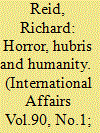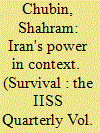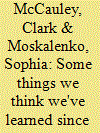|
|
|
Sort Order |
|
|
|
Items / Page
|
|
|
|
|
|
|
| Srl | Item |
| 1 |
ID:
131420


|
|
|
|
|
| Publication |
2014.
|
| Summary/Abstract |
This article examines the international engagement with Africa from the First World War and the apex of colonial rule through to the present day. It is argued that there have been dramatic shifts throughout this period-from increasing interventionism on the part of the colonial state, to decolonization and the emergence of nation-states with independent foreign policy programmes, to the predations and influences of the Cold War, to the developmentalism and humanitarianism of the contemporary era. Yet, there has also been marked continuity in terms of policy, perception and practice. In particular, Africa has long been seen in terms of economic opportunity-a place where markets and raw materials abound-and of military and political threat, a place in which intrinsic instability makes external intervention both desirable and inevitable. While immediate contexts have changed over time, the international engagement with the continent remains essentially economic and military. A concern for democratization and development represents a relatively new element, although even this can be traced to the paternalistic humanitarianism of the colonial era and, earlier still, moral stances toward Africa in the nineteenth century.
|
|
|
|
|
|
|
|
|
|
|
|
|
|
|
|
| 2 |
ID:
086173


|
|
|
|
|
| Publication |
2009.
|
| Summary/Abstract |
Iran-US relations - strained at the best of times since the 1979 Iranian revolution - have never been worse than during the past six years, due to the much more intense interaction between the two states since the revelations about Iran's nuclear ambitions and the United States' invasion of Iraq. The United States sees Iran as a potential strategic rival, while Tehran views the American presence in the Middle East as a potential existential threat. This has led to zero-sum thinking and has raised the stakes correspondingly. In the process there has been an inflation of the Iranian threat, which is poorly understood and often exaggerated. Depicting Iran as a military threat obscures the real political threat the country poses to its region; Iran's regional behaviour has been neglected and overshadowed by the contentious nuclear issue. However, it is precisely Iran's behaviour and goals which feed concerns about its nuclear ambitions.
It is important to put the Iranian threat in context. In recent years, what was largely a bilateral rivalry between Iran and the United States has become displaced and expanded throughout the region: Palestine, Syria, Lebanon, Iraq and the Gulf states have all been affected by the growing tension, and there are signs that Iranian influence is becoming stronger in these areas. Iran's more active and effective diplomacy in the Middle East is due to the conjunction of three separate trends, all of which are reversible. The first is the emergence of a permissive regional environment, hospitable to Iran's diplomacy; the second, the ascension of an ideological and hardline conservative government in Tehran, predisposed to a more activist diplomacy; and third, the oil windfall, which freed resources for seeding movements and clients supportive of Iranian goals. However, the influence that has accrued to Iran as a result of these trends is transitory and precarious, and there are constraints on Iran becoming a regional superpower.
|
|
|
|
|
|
|
|
|
|
|
|
|
|
|
|
| 3 |
ID:
133537


|
|
|
|
|
| Publication |
2014.
|
| Summary/Abstract |
Anyone who cares about both the national security threat arising from transnational al Qaeda-inspired terrorism and the need to develop a measured, effective response to this threat owes a great deal of gratitude to Marc Sageman. He was an early teller of inconvenient truths. As he notes in his essay, the tumultuous years following 9/11 were marked by the rise and mass dissemination of wild, ahistorical, and anecdote-based theories about the causes and possible solutions to violence motivated by the virulent ideology propagated by Sayyid Qutb in the 1950s and tragically brought to our shores by Osama bin Laden. Sageman insisted, however, that theory must be supported by evidence. He presented the facts as he saw them without regard to those he was undercutting on each side of the political spectrum. Over a decade after 9/11, his work has withstood the test of time and had a significant positive impact on our understanding of why al Qaeda attacked us and our policies for confronting this threat.
|
|
|
|
|
|
|
|
|
|
|
|
|
|
|
|
| 4 |
ID:
133539


|
|
|
|
|
| Publication |
2014.
|
| Summary/Abstract |
Dr. Sageman makes a good point that despite the influx of government funding in the last decade, terrorism scholars have not been able to answer what he calls a "simple question"-what leads a person to turn to political violence? But Dr. Sageman's conclusion that scholars' inability to answer this question is evidence of stagnation in the field is incorrect. First, most scholars who study terrorism are addressing risk factors for terrorism at the level of societies, not individuals, so it is hardly surprising that there is no "consensus answer" to Dr. Sageman's question. Second, the question Dr. Sageman poses about individual level decision-making is not at all simple to assess. It is difficult to make gross generalizations about what leads individuals to do what they do in any area of life; difficulty in answering this question is not unique to terrorism experts. Consider analogous questions about individual decision-making with regard to other life choices. Despite significantly more than a decade of study, neither scientists nor humanists have been able to explain, ex ante, what leads a person to fall in love, to murder another, or to choose a particular career path (as a terrorist, or otherwise). A detailed study of an individual's life history might enable scholars to propose ex post hypotheses as to why that individual chose a career as a terrorism expert rather than as a terrorist, but even then, experts from varying disciplines (including psychiatry) would focus on different parts of the problem, seen through different lenses. It is not clear why Dr. Sageman holds terrorism scholarship to a standard that no other group of scholars aiming to understand and predict human behavior has yet been able to achieve.
|
|
|
|
|
|
|
|
|
|
|
|
|
|
|
|
| 5 |
ID:
133538


|
|
|
|
|
| Publication |
2014.
|
| Summary/Abstract |
It is a pleasure to have this opportunity to respond to a distinguished colleague's concerns about the progress of terrorism research since the 9/11 attacks. Marc Sageman sees little progress and identifies numerous impediments to research, notably including lack of good data and over-reliance on formal modeling
|
|
|
|
|
|
|
|
|
|
|
|
|
|
|
|
|
|
|
|
|